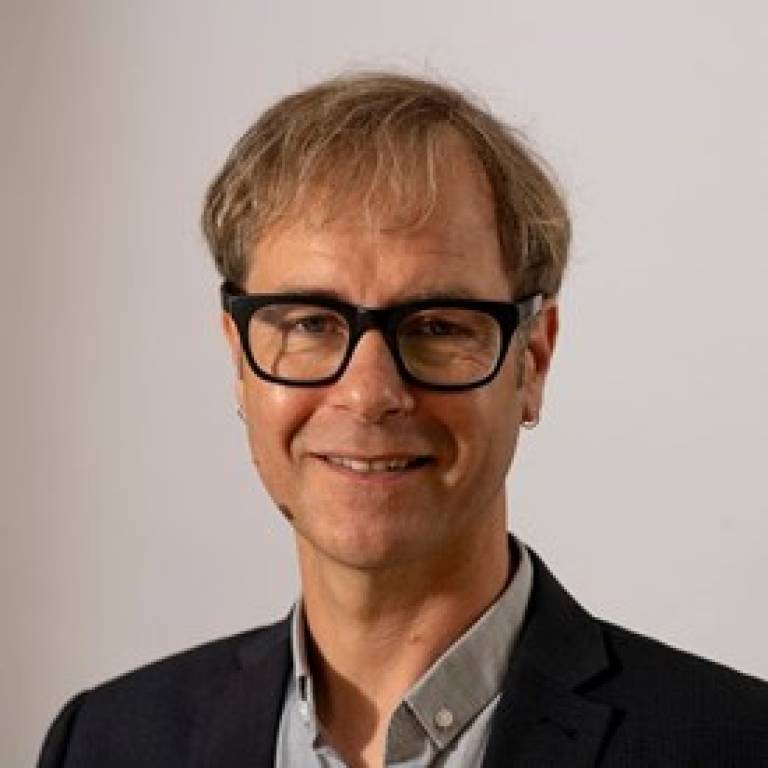Research Spotlight: Professor Simon Lewis FRS
1 June 2023
Meet Professor Simon Lewis, a field ecologist who studies global environmental change at UCL’s Department of Geography. Simon was recently elected as a Fellow of the Royal Society, in recognition of his outstanding contribution to science. Find out more about Simon's research.

What is your role and what does it involve?
I am primarily a research scientist, interested in how humans are changing the environment, particularly the impact of environmental change in the tropics. My role is varied, from managing expeditions to the world’s tropical forests, supervising research students, dealing with a tonne of bureaucracy that the university puts in the way of doing your research, analysing data, publishing scientific papers, and applying for funding for my research and my research team.
What do you find most interesting or enjoyable about your work?
I find four things particularly enjoyable. I really like doing fieldwork to new places, the sense of adventure of it, and hopefully discovering new things. I like churning over a problem, reading around a problem, and trying to work some connections out. Third, I really like the moments of finding out something really new, that nobody else has ever known. That’s the coolest things about doing science. Finally, I like talking to policy makers, and engaging with the public, as it gives me some agency in the world.
Tell us about your research
I am in a bit of a reflective mood, as I have recently been elected as a Fellow of the Royal Society, equivalent to being elected a member of a National Academy of Science. This is to reflect my contributions to science. For twenty years, I have been trying to understand how the world’s tropical forests are responding to global environmental changes. I used huge amounts of field data – hundreds of thousands of individually measured tropical trees – to show that the world’s intact tropical forests annually absorbed around 15% of global anthropogenic carbon dioxide emissions in recent decades, slowing climate change, but that this uptake is now in decline.
A spin-off from this I did not have any data from the world’s second largest wetland, in the central Congo Basin, so started to think deeply about this place. After years of fieldwork, led by Dr Greta Dargie and Dr Yannick Bocko, we described and mapped a major new ecosystem, the central Congo peatlands. This turns out to be the world’s largest tropical peatland complex. This was a major finding, mapping a peatland spanning 16.7 million hectares, and storing 29 billion tonnes of carbon in its peat – equivalent to 3 years of global fossil fuel emissions. Major discoveries like this are rare in the twenty-first century.
What led you to pursue a research career in this field?
I began hill walking, climbing and mountaineering in my teens, and loved the sense of freedom associated with being in the wild. I wanted more of this so did my PhD on tropical forest ecology, mainly as a vehicle to have an adventure in the Amazon, where I lived for two years doing my fieldwork. From there I wanted to do something useful to the world in terms of moving society towards a more just and less environmentally exploitative one, but a life that also included some adventure and was intellectually stimulating. Being a research scientist has delivered on these so far!
What working achievement or initiative are you most proud of?
I am not sure, but I think I have helped push the Congo Basin as an important region of the world to understand, project and invest in
What's next on the research horizon for you?
I worry about tipping points – when the environment changes that little bit too much that it causes major change to ecosystems and societies – so am thinking more about these.
More prosaically, the network of tropical forest monitoring sites across Africa I co-founded --to understand how they are changing as the environment changes -- is very valuable yet is (perplexingly to me) very hard to fund. I need funds to re-measure all those hundreds of thousands of trees to understand how much carbon dioxide they are taking out of the atmosphere, and help me understand how near/far they are from becoming a carbon source in the future. So, fundraising, but for a research purpose.
Can you share some interesting work that you read about recently?
Nothing to do with my work, but as a parent this analysis of adult mental health and how old you were as a child when you got your first smartphone is deeply concerning.
What would it surprise people to know about you?
I ran a 52 mile off-road ultramarathon this year!
Links
- Royal Society announcement
- UCL announcement
- Congo peatlands could emit billions of tonnes of carbon in drier climate
- Professor Simon Lewis' academic profile
- UCL Geography
 Close
Close

